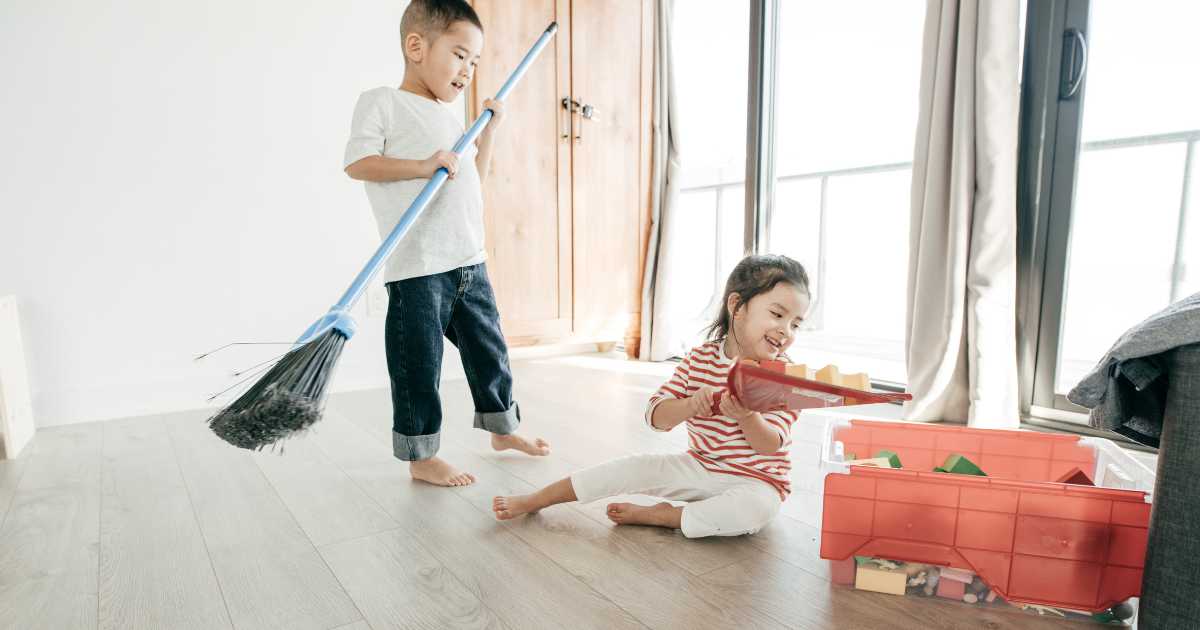How to Make Kids Happy in 13 Practical Ways
As a parent or guardian, you want nothing but the best for your child. One of your goals is to make sure that your child is happy and content. However, the challenge is that what makes kids happy can be quite different from what adults might think.
In this blog post, we’ll explore how to make kids happy in daily life. Whether you’re a new parent or have been raising children for years, there’s always something new to learn when it comes to helping your child thrive and find joy in life.
How to Make Kids Happy
1. Limit Your Child’s Screen Time

While technology has many benefits, it can also be a major source of stress and unhappiness for kids. Excessive screen time can lead to a sedentary lifestyle, which can negatively impact a child’s physical health.
Additionally, social media and other online platforms can contribute to feelings of isolation, anxiety, and depression. Therefore, limiting your child’s screen time is important to ensure that they have a healthy balance of physical activity, social interaction, and relaxation.
To limit screen time, consider setting clear rules and boundaries around technology use. For example, you could establish a “no screens before bedtime” rule or limit the amount of time your child spends on social media each day.
Encourage your child to engage in other activities, such as reading, playing outside, or spending time with friends and family. Limiting screen time can help your child develop healthier habits and reduce stress and anxiety.
2. Set Reasonable Expectations for Them
Having high but reasonable expectations for your child can help them develop a sense of responsibility and achievement. However, it’s important to balance high expectations with realistic goals and an understanding of your child’s individual needs and abilities.
Unrealistic expectations can lead to stress and anxiety, which can negatively impact your child’s happiness and well-being. To set high but reasonable expectations, consider your child’s interests, strengths, and challenges.
Set goals that are challenging but achievable, and offer support and guidance as your child works towards these goals. Celebrate your child’s successes and encourage them to learn from their mistakes. Setting high but reasonable expectations can help your child develop a sense of responsibility and achievement without causing undue stress or anxiety.
3. Assign Chores

Assigning chores to your child can help them to develop a sense of responsibility and contribution to the family. Chores can also help your child develop important life skills, such as time management, organization, and self-discipline.
By assigning age-appropriate chores, you can help your child develop a sense of pride and accomplishment in their work. Consider your child’s age, interests, and abilities to assign chores.
Start with simple tasks, such as putting away toys or setting the table, and gradually increase the tasks’ complexity as your child ages. Offer praise and positive reinforcement for a job well done, and be patient as your child learns and develops new skills.
By assigning chores, you can help your child develop important life skills and contribute to the family in a meaningful way.
4. Practice Positive Reinforcement
Positive reinforcement is a powerful tool for promoting positive behaviors and attitudes in children. Using positive reinforcement, you can encourage your child to engage in behaviors that contribute to their happiness and well-being.
Positive reinforcement can also help build your child’s self-esteem and sense of accomplishment. To use positive reinforcement, offer praise and rewards for positive behaviors and accomplishments.
Be specific in your praise, and focus on effort rather than just the end result. Offer rewards that are meaningful to your child, such as extra time to play outside or a special treat.
5. Spend Quality Time with Your Child

Spending quality time with your child is one of the most important things you can do to promote their happiness and well-being. When you spend time with your child, you show them they’re loved and valued. You also provide them with a sense of security and stability.
To spend quality time with your child, consider their interests and hobbies. Look for opportunities to engage in activities together. This could include playing games, reading books, going for walks, or simply having a conversation.
Make an effort to be present and attentive during these activities. You should also try to limit distractions when with them, such as phones or television. Spending quality time with your child can strengthen your bond and promote their overall happiness and well-being.
6. Foster Their Independence
As children grow and develop, it’s important to foster their independence and encourage them to take on more responsibility for their own everyday lives. Independence can help children develop confidence and self-esteem. It can also teach them important life skills.
To foster your child’s independence, give them opportunities to make choices and take on new responsibilities. This could include allowing them to choose their own clothes or decide what to make for dinner. It could also involve giving them tasks such as doing their own laundry or managing their own schedule.
Offer support and guidance as needed, but also allow your child to make mistakes and learn from them. By fostering your child’s independence, you can help them develop important life skills and build confidence in themselves.
7. Help Them Develop Social Skills

Social skills are essential for children’s happiness and success in life. Children with strong social skills are more likely to have positive, strong relationships with others. They’re also more likely to succeed academically and professionally.
To help your child develop social skills, encourage them to interact with others positively and respectfully. Teach them how to listen actively, constructively express their feelings and opinions, and empathize with others. Look for opportunities for your child to interact with others, such as play dates, team sports, or volunteer activities.
Encourage your child to join clubs or organizations that align with their interests, and help them develop strong friendships. Helping your child develop social skills can promote their emotional intelligence, happiness levels, and success in life.
8. Encourage Physical Activity

Physical activity is important for children’s physical health and well-being. It can also have a significant impact on their mental health and happiness. Regular exercise has been shown to reduce stress and anxiety, improve mood, and promote overall feelings of well-being.
To encourage physical activity, look for opportunities for your child to engage in activities they enjoy. Examples would be playing sports, unstructured playtime, dancing, or going for a bike ride. Make physical activity a part of your family’s routine, such as going for a walk after dinner or having a family game of soccer on the weekend.
Encourage your child to get outside and play, and limit their screen time to ensure they have plenty of time for physical activity. By encouraging physical activity, you can promote your child’s physical and mental health, and help them to develop lifelong habits that’ll contribute to their overall happiness and well-being.
9. Create a Positive Environment
Creating a positive environment in your home is essential for promoting your child’s happiness, well-being, and long-term success. A positive environment can help your child feel safe and secure and promote feelings of optimism and positivity.
To create a positive environment, focus on positive communication and interactions. Use positive language and avoid criticism or negativity. Encourage your child to express their feelings and opinions, and validate their emotions. Regardless of your parenting styles, offer praise for positive behaviors and accomplishments.
Create a comfortable and welcoming space in your home, and encourage your child to personalize their own space. Creating a positive environment can help your child feel happy, safe, and loved. It also boosts their emotional intelligence.
10. Teach Them About Gratitude
Gratitude is an important part of overall happiness and well-being. Teaching your child to practice gratitude can help them develop a more positive attitude toward life. It will also improve their overall sense of happiness.
To practice gratitude, encourage your child to focus on their life’s positive aspects and express gratitude for the happy people and things they appreciate. One way to encourage gratitude is to create a gratitude journal or jar. Each day, your child can write down something they’re grateful for and add it to the journal or jar.
Alternatively, you could start a gratitude ritual, such as sharing something you’re grateful for at the dinner table each night. By practicing gratitude, you can help your child develop a more positive outlook on life and improve their overall sense of well-being.
11. Help Your Kid Develop Healthy Relationships
Having positive relationships is essential for children’s happiness and well-being. Positive relationships can help children feel loved and supported. They can also provide a sense of security and belonging, making your child happy.
To help your child form good relationships, encourage positive communication and interactions. Teach your child how to listen actively and express their feelings and opinions constructively.
Encourage your child to empathize with others and to treat others with respect and kindness. Look for opportunities for your child to interact with others, such as through play dates, clubs, or volunteer activities. Helping your child form good relationships can promote their happiness and success in life.
12. Create Proper Routines
Establishing proper routines is important for children’s happiness and well-being. Routines can provide a sense of structure and predictability, which can help children feel secure and in control.
To establish proper routines, create a schedule that includes regular times for meals, homework, playtime, and bedtime. Stick to this schedule as much as possible, and communicate any changes in advance.
Encourage your child to participate in creating the schedule and offer choices within it. Establishing proper routines can help your child feel organized and prepared, which can contribute to their overall quality of life.
13. Learn to Listen to Them
Listening to your child is essential for promoting their happiness and well-being. When you listen to your child, you show them their feelings and opinions matter. It also provides them with a sense of validation and support.
To listen to your child, create a safe and welcoming environment for them to express their thoughts and feelings. Encourage your child to communicate openly and honestly, and validate their emotions, whether positive or negative. Effective parents don’t dismiss their children.
Pay attention to children’s nonverbal cues, and take the time to actively listen to what they have to say. By listening to your child, you can promote their overall happiness and psychological well-being.
How to Tell if Your Child Is Unhappy
As a parent, it can be difficult to tell if your child is unhappy. Children may not always express their emotions clearly or directly, and it can be challenging to distinguish between normal mood swings and more serious concerns.
However, there are some signs and behaviors that may indicate your child is unhappy or struggling in some way. Here are some ways to tell if your child is unhappy:
Changes in behavior
If your child starts to behave differently than usual, it may be a sign they’re unhappy. This could include withdrawing from activities they used to enjoy, avoiding social interactions, or becoming more irritable or moody.
Difficulty sleeping or eating
Children who are unhappy may experience changes in their sleep or eating habits. They may have trouble falling asleep, staying asleep, or waking up feeling rested. They may also lose their appetite or have difficulty eating.
Physical symptoms
Unhappiness can manifest in physical symptoms, such as headaches, stomachaches, or other aches and pains. If your child complains of physical symptoms without any apparent medical cause, it may be a sign that they’re struggling emotionally.
Loss of interest
If your child loses interest in things they used to enjoy, it may be a sign they’re unhappy. This could include activities, hobbies, or even spending time with friends or family members.
Difficulty concentrating
Children who are unhappy may have difficulty concentrating or staying focused. They may struggle to complete schoolwork or other tasks that require sustained attention.
Negative self-talk
If your child talks negatively about themselves or expresses feelings of low self-esteem, it may be a sign they’re unhappy. They may say things like “I’m not good enough” or “Nobody likes me.”
Lack of energy
Unhappiness can lead to feelings of fatigue or low energy. If your child seems tired or lethargic all the time, it may be a sign they’re struggling emotionally.
If you notice any of these signs or behaviors in your child, it’s important to talk to them about how they’re feeling. Let them know that you are there to support them and help them work through any challenges they may be facing.
If you notice any of these signs or behaviors in your child, it’s important to talk to them about how they’re feeling. Let them know that you are there to support them and help them work through any challenges they may be facing.
Conclusion
We hope this guide has been helpful on how to make kids happy. Raising happy children requires intentional effort from parents and caregivers. It’s important to recognize that happiness is not a destination, but a journey that requires ongoing attention and nurturing.
Remember, being attuned to your child’s emotional state, helping them form good relationships, establishing proper routines, and listening to your child can make a big difference. By being present, supportive, and responsive to your child’s needs, you can help them develop the tools and resilience they need to navigate life’s challenges and thrive.






